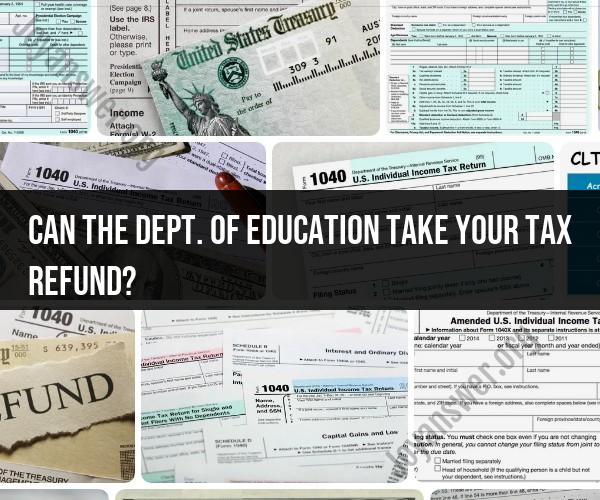Can the Dept. of Education take your tax refund?
Yes, in certain circumstances, the U.S. Department of Education can take your federal income tax refund through a process known as a tax refund offset. This typically occurs when you have defaulted on federal student loans, and the Department of Education has initiated collection actions to recover the outstanding debt.
Here's how the tax refund offset process works:
Loan Default: If you have defaulted on federal student loans, meaning you have failed to make payments as required by your loan agreement, the Department of Education may take steps to recover the debt.
Notice and Opportunity to Avoid Offset: Before your tax refund is offset, you should receive advance notice from the Department of Education, informing you of their intent to initiate a tax refund offset. This notice provides you with an opportunity to dispute the debt, make payment arrangements, or request a hearing if you believe the offset is not justified.
Offset: If you do not take action to resolve the defaulted debt or if you do not successfully challenge the offset through a hearing process, the Department of Education can instruct the IRS to intercept your federal income tax refund to repay the outstanding student loan debt.
Application to Outstanding Debt: The amount of your tax refund that is intercepted will be applied to the outstanding student loan balance, reducing the amount you owe. Any remaining balance on the loan will still need to be addressed through repayment or other means.
It's important to note that the Department of Education typically uses tax refund offsets as a collection tool for defaulted federal student loans. If you are in good standing with your loan payments, your tax refund should not be at risk of offset.
If you believe you may be at risk of having your tax refund offset due to a defaulted student loan, it's advisable to contact your loan servicer or the Department of Education as soon as possible to discuss options for loan rehabilitation, consolidation, or other repayment arrangements to bring your loans out of default and prevent the offset of your tax refund. Additionally, staying informed about your loan status and responding to any official notices is crucial to understanding and addressing potential offset actions.
Tax Refunds and Student Loans: Can the Department of Education Intercept Your Refund?
Yes, the Department of Education (DOE) can intercept your tax refund to offset defaulted federal student loan debt. This process is known as a tax refund offset.
Protecting Your Tax Refund: Understanding the DOE's Authority.
The DOE has the authority to intercept tax refunds under the Treasury Offset Program. This program allows federal agencies to collect debts by offsetting tax refunds.
To be eligible for a tax refund offset, the DOE must certify the debt to the Treasury Department. The Treasury Department will then send a notice to the borrower informing them of the offset. The borrower has 60 days to appeal the offset. If the borrower does not appeal the offset, the Treasury Department will offset the tax refund to pay the debt.
Navigating Financial Obligations: How the Department of Education Can Affect Your Tax Refund.
If you have defaulted on your federal student loans, the DOE may intercept your tax refund to offset the debt. This can have a significant impact on your financial situation. If you are facing a tax refund offset, there are a few things you can do:
- Contact the DOE. You can contact the DOE to discuss your options for avoiding a tax refund offset. You may be able to set up a payment plan or enroll in a rehabilitation program to get your loans out of default.
- File your taxes early. If you know that you are facing a tax refund offset, it is important to file your taxes early. This will give you more time to appeal the offset or to make other arrangements to pay your debt.
- Claim your dependents. If you have dependents, you may be able to claim them on your tax return. This will increase your tax refund and reduce the amount of money that the DOE can offset.
If you are struggling to make your student loan payments, there are help resources available. You can contact the DOE or a student loan advisor for assistance.
Additional tips:
- If you are receiving a tax refund, consider filing your taxes electronically and direct depositing your refund into a bank account that is not linked to your student loans. This will make it more difficult for the DOE to intercept your refund.
- If you have any questions or concerns about a tax refund offset, you should contact the DOE or a tax professional.












